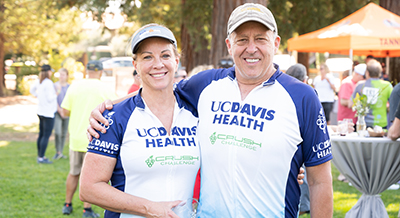Q. When and why did you join Davis?
I joined UC Davis School of Medicine in December 2018 from the University of Chicago. Many things about UC Davis attracted me — largely the feel of the institution, the culture and the people who make it such a great place.
Q. What is your approach to care?
My patients and the people I work with are the best part of my job. It is humbling to be central to the care of incredibly strong women going through the biggest fight of their life. My patients keep me centered in what matters in life and push me to always be looking for the next treatment, clinical trial, procedure or supportive therapy to improve their prognosis and the quality of their life. My approach to care is to get to know my patients as people, educate them about their diagnosis and treatment options, and come up with an individualized treatment plan consistent with their goals.
Q. What is your vision for the Division of Gynecologic Oncology?
The division has so many strengths, with brilliant, talented care providers who establish the fabric of our division and the cohesiveness of our team. I want to capitalize on these strengths and take our division to the next level of excellence. My vision is to improve our regional and national recognition, grow our clinical trials program, and be the referral center for Northern California.
Q. What are you most proud of?
Publications, titles and awards may add up on one’s CV, but the relationships I’ve built with the gynecologic oncologists I’ve trained and the leaders who have mentored me I hold very close. Cytoreductive surgery to remove all visible disease for advanced ovarian cancer is probably the highlight of my surgical portfolio. This type of surgery pulls together components of most of the procedures that gynecologic oncologists do. Patients who have all of their disease removed live longer and have significantly better outcomes. I’m passionate not only about doing the surgery, but also about identifying the right candidates, since the level of aggressiveness that’s right for one patient might not be right for another.
Q. What is the next front in gynecologic oncology research and technology?
It’s exciting to see how much medical therapy for gynecologic cancer has exploded in the past five to 10 years. Many of the novel agents — targeted therapies — recently approved and at the forefront of investigation have come into play since I completed training. Treatment options for patients have increased dramatically, but we still have a long way to go to maximize outcomes for our patients. The use of molecular profiling, targeted agents such as PARP inhibitors, immunotherapy and angiogenesis inhibitors is booming, and I am optimistic about what this will mean for our patients. These new therapy options would allow for a precision medicine approach to treatment.




